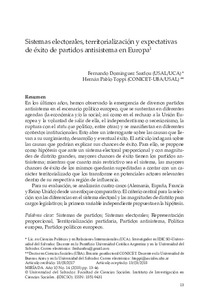Por favor, use este identificador para citar o enlazar este ítem:
https://repositorio.uca.edu.ar/handle/123456789/8743| Campo DC | Valor | Lengua/Idioma |
|---|---|---|
| dc.contributor.author | Domínguez Sardou, Fernando | es |
| dc.contributor.author | Toppi, Hernán Pablo | es |
| dc.date.accessioned | 2019-09-13T21:21:51Z | - |
| dc.date.available | 2019-09-13T21:21:51Z | - |
| dc.date.issued | 2018 | - |
| dc.identifier.citation | Domínguez Sardou, F., Toppi, H. P. (2018). "Sistemas electorales, territorialización y expectativas de éxito de partidos antisistema en Europa" [en línea]. En Miríada, 10(14). Disponible en: https://repositorio.uca.edu.ar/handle/123456789/8743 | es |
| dc.identifier.issn | 2250-4621 (online) | - |
| dc.identifier.issn | 1851-9431 (impreso) | - |
| dc.identifier.uri | https://repositorio.uca.edu.ar/handle/123456789/8743 | - |
| dc.description.abstract | Resumen: En los últimos años, hemos observado la emergencia de diversos partidos antisistema en el escenario político europeo, que se sustentan en diferentes agendas (la económica y/o la social; así como en el rechazo a la Unión Europea y la voluntad de salir de ella, el independentismo o secesionismo, la ruptura con el statu quo político, entre otras) y se manifiestan en diferentes contextos institucionales. Esto abre un interrogante sobre las causas que llevan a su surgimiento, desarrollo y eventual éxito. El artículo indagará sobre las causas que podrían explicar sus chances de éxito. Para ello, se propone como hipótesis que ante un sistema electoral proporcional y con magnitudes de distrito grandes, mayores chances de éxito tienen los partidos antisistema; mientras que cuanto más restrictivo sea el sistema, las mayores chances de éxito de los mismos quedarán supeditadas a contar con un carácter territorializado que los transforme en potenciales actores relevantes dentro de su respectiva región de influencia. Para su evaluación, se analizarán cuatro casos (Alemania, España, Francia y Reino Unido) desde un enfoque comparativo. El criterio central para la selección son las diferencias en el sistema electoral y las magnitudes de distrito para cargos legislativos; la primera variable independiente propuesta en la hipótesis. | es |
| dc.description.abstract | Abstract: In recent years, we have seen the rise of different “anti-system parties” in the European political scene, which in turn are based on different agendas (such as the economic and / or social agenda, the rejection of the European Union and the willingness to leave it, the independence or secessionism and the breakdown with the political status quo, among others). Their emergence in different institutional backgrounds opens a question about the causes that lead to the rise, development and eventual success of these parties. The article will inquire about causes that could explain the chances of success of the aforementioned parties. The proposed hypothesis is that “whenever there is a proportional electoral system with large district magnitudes, the anti-system parties have greater chances of success; while whenever the system is more restrictive, the greater chances of success of these parties will depend on having a territorialized character that transforms them into potential relevant actors within their respective region of influence”. To evaluate the hypothesis, four cases (Germany, Spain, France and the United Kingdom) will be analyzed with a comparative approach; the criteria for the selection of those are the differences in the electoral system and the magnitudes of district for legislative positions, which is the first independent variable proposed in the hypothesis. | es |
| dc.format | application/pdf | es |
| dc.language.iso | spa | es |
| dc.publisher | Universidad del Salvador. Facultad de Ciencias Sociales. Instituto de Investigación en Ciencias Sociales | es |
| dc.rights | Acceso abierto | * |
| dc.rights.uri | http://creativecommons.org/licenses/by-nc-sa/4.0/ | * |
| dc.source | Miríada, 10(14), 2018 | es |
| dc.subject | SISTEMAS ELECTORALES | es |
| dc.subject | CIENCIAS POLITICAS | es |
| dc.subject | PARTIDOS POLITICOS | es |
| dc.subject | EUROPA | es |
| dc.subject | ALEMANIA | es |
| dc.subject | ESPAÑA | es |
| dc.subject | FRANCIA | es |
| dc.subject | INGLATERRA | es |
| dc.title | Sistemas electorales, territorialización y expectativas de éxito de partidos antisistema en Europa | es |
| dc.type | Artículo | es |
| uca.disciplina | CIENCIA POLITICA | es |
| uca.issnrd | 1 | es |
| uca.affiliation | FIl: Domínguez Sardou, Fernando. Universidad del Salvador; Argentina | es |
| uca.affiliation | FIl: Domínguez Sardou, Fernando. Pontificia Universidad Católica Argentina; Argentina | es |
| uca.affiliation | Fil: Toppi, Hernán Pablo. Consejo Nacional de Investigaciones Científicas y Técnicas; Argentina | es |
| uca.affiliation | Fil: Toppi, Hernán Pablo. Universidad de Buenos Aires; Argentina | es |
| uca.affiliation | Fil: Toppi, Hernán Pablo. Universidad del Salvador; Argentina | es |
| uca.version | publishedVersion | es |
| item.languageiso639-1 | es | - |
| item.fulltext | With Fulltext | - |
| item.grantfulltext | open | - |
| Aparece en las colecciones: | Artículos | |
Ficheros en este ítem:
| Fichero | Descripción | Tamaño | Formato | |
|---|---|---|---|---|
| sistemas-electorales-territorializacion-expectativas.pdf | 540,93 kB | Adobe PDF |  Visualizar/Abrir |
Visualizaciones de página(s)
473
comprobado en 18-feb-2026
Descarga(s)
456
comprobado en 18-feb-2026
Google ScholarTM
Ver en Google Scholar
Este ítem está sujeto a una Licencia Creative Commons

